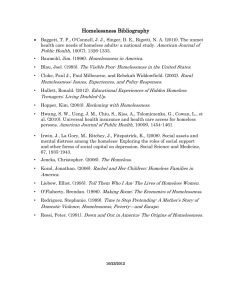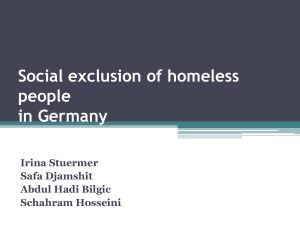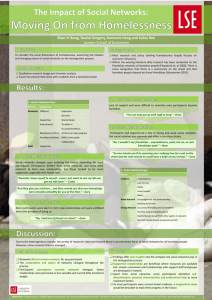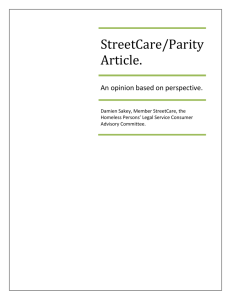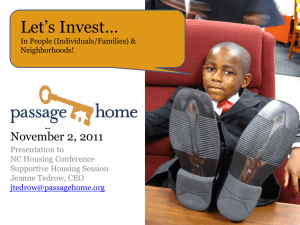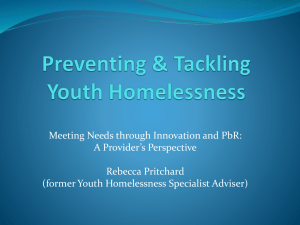White Paper - Maine Homeless Planning
advertisement
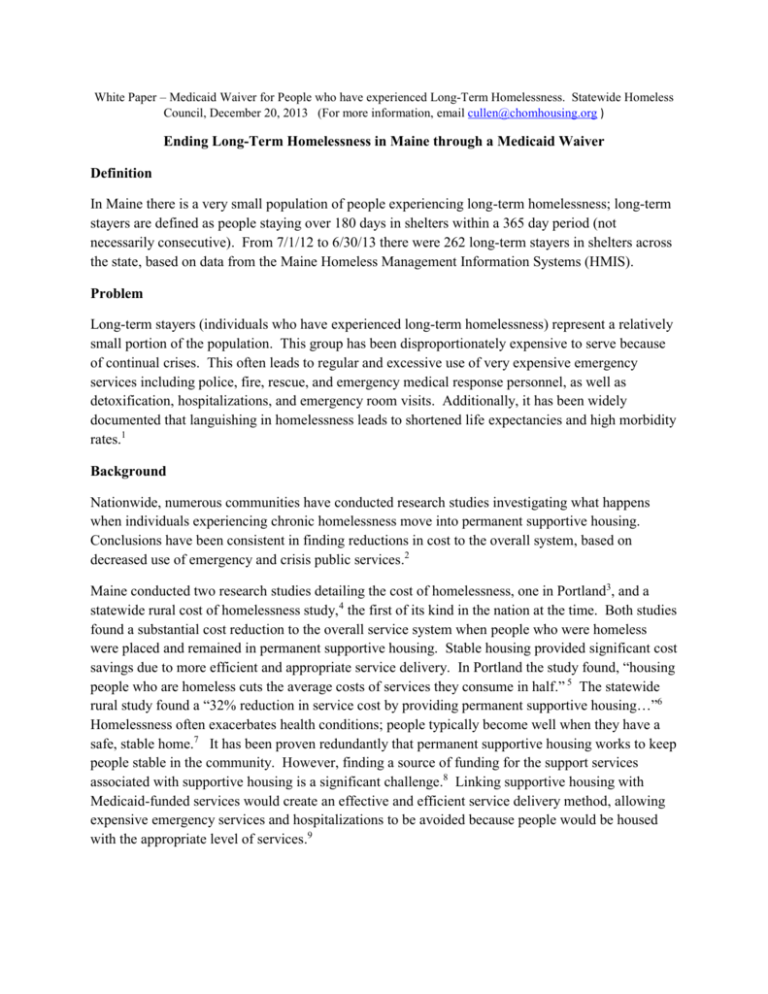
White Paper – Medicaid Waiver for People who have experienced Long-Term Homelessness. Statewide Homeless Council, December 20, 2013 (For more information, email cullen@chomhousing.org ) Ending Long-Term Homelessness in Maine through a Medicaid Waiver Definition In Maine there is a very small population of people experiencing long-term homelessness; long-term stayers are defined as people staying over 180 days in shelters within a 365 day period (not necessarily consecutive). From 7/1/12 to 6/30/13 there were 262 long-term stayers in shelters across the state, based on data from the Maine Homeless Management Information Systems (HMIS). Problem Long-term stayers (individuals who have experienced long-term homelessness) represent a relatively small portion of the population. This group has been disproportionately expensive to serve because of continual crises. This often leads to regular and excessive use of very expensive emergency services including police, fire, rescue, and emergency medical response personnel, as well as detoxification, hospitalizations, and emergency room visits. Additionally, it has been widely documented that languishing in homelessness leads to shortened life expectancies and high morbidity rates.1 Background Nationwide, numerous communities have conducted research studies investigating what happens when individuals experiencing chronic homelessness move into permanent supportive housing. Conclusions have been consistent in finding reductions in cost to the overall system, based on decreased use of emergency and crisis public services.2 Maine conducted two research studies detailing the cost of homelessness, one in Portland3, and a statewide rural cost of homelessness study,4 the first of its kind in the nation at the time. Both studies found a substantial cost reduction to the overall service system when people who were homeless were placed and remained in permanent supportive housing. Stable housing provided significant cost savings due to more efficient and appropriate service delivery. In Portland the study found, “housing people who are homeless cuts the average costs of services they consume in half.” 5 The statewide rural study found a “32% reduction in service cost by providing permanent supportive housing…”6 Homelessness often exacerbates health conditions; people typically become well when they have a safe, stable home.7 It has been proven redundantly that permanent supportive housing works to keep people stable in the community. However, finding a source of funding for the support services associated with supportive housing is a significant challenge.8 Linking supportive housing with Medicaid-funded services would create an effective and efficient service delivery method, allowing expensive emergency services and hospitalizations to be avoided because people would be housed with the appropriate level of services.9 Effective Models The Massachusetts Housing and Shelter Alliance (MHSA) and Massachusetts Behavioral Health Partnership (MBHP) initiated a pilot program utilizing a Medicaid Waiver to deliver support services to chronically homeless individuals. The Community Support Program for People Experiencing Chronic Homelessness (CSPECH) provides support services to individuals who are chronically homeless so that they can become and remain stably housed.10 The South Middlesex Opportunity Council (SMOC) designed the first phase of its Plan to End Homelessness incorporating CSPECH, pairing permanent supportive housing with Medicaid-funded case management support for individuals who are chronically homeless. A study was conducted comparing service usage during the six months prior to being housed, and after housing, in SMOC’s 32-funded slots. Findings indicated an 85% system-wide cost savings.11 Overall costs to the healthcare system also drastically declined. Based on 2012 pilot program data, “CSPECH has served 372 tenants” and has saved approximately $3 million “when accounting for pre-housing emergency and prolonged medical costs.”12 Due to its broad success, CSPECH expanded from a pilot to a statewide program.13 The State of Louisiana created a more inclusive Home and Community-Based Services (HCBS) program which expanded services so that Medicaid could be coupled with permanent supportive housing. Louisiana directly incorporates its HCBS program into its permanent housing program. 14 The 3,000-unit PSH program in Louisiana’s Gulf Coast Region “is the nation’s first large-scale cross-disability, integrated PSH initiative to include sustainable funding for both housing and supportive services.”15 Louisiana engineered a centralized, policy-motivated system which serves all of the primary permanent supportive housing target populations.16 This has proven to be very successful, as the program has stably housed over 2,500 of the most vulnerable individuals in the region. Housing retention is high, and system costs have been reduced.17 In many cases, state resources are already used to provide supportive services in housing;18 financing these services through Medicaid simply allows for more effective and efficient service delivery resulting in a reduced cost burden to the State. The results are measurable and include system-wide savings: Significant and rapid quality of life improvements, and cost-effective treatment of medical issues – both physical and emotional. Instead of paying for a range of emergency services that are inefficient and expensive short-term approaches to healthcare, coupling sustainable supportive services with housing creates the capacity for preventive care for people experiencing long-term homelessness. This starts with resolving their homelessness, and ultimately results in developing an effective, individualized support network for each individual that promotes health and independence. Solution – Proposal The Maine Statewide Homeless Council recommends that a Medicaid Homeless Waiver, similar to what is known in other states as the 1115 Waiver, be immediately created in Maine to cover support services for individuals experiencing long-term homelessness, so that they can attain and retain stability via permanent supportive housing. The primary focus would be expanding eligibility to individuals who are not otherwise Medicaid eligible. Services covered should be broad-reaching, including outreach support services, which should begin with individuals in an emergency shelter or streets, continue into successful housing placements, and remain, so as to ensure permanent stability. The proposed new waiver should be designed to cover behavioral health and physical health care services. Similar to the PATH program, case managers would support clients in securing stable housing and would continue to follow them, providing services for stability there. The case manager would link clients to mainstream resources as needed, such as psychiatry, primary health, specialists, daily living skills services, transportation, addiction recovery support including AA meetings, psychotherapy, and other supports that would contribute to the stability of the client and increase their ability to maintain housing. This waiver would allow for these services to be reimbursed. The ongoing relationship that the case manager builds with the client would support the client to follow through with these services to increase overall health and functioning, which will reduce the cost to the system. Permanent supportive housing is a proven method for ending chronic homelessness. One of the biggest challenges for permanent supportive housing is ensuring adequate support services. A more inclusive Medicaid program would alleviate this challenge. It would create successful, effective, and efficient programs that would allow stability and improvement, and generate system-wide cost savings. Using the Maine Cost of Homelessness Studies as a gauge, we can expect a significant (42%) cost reduction statewide in emergency services when permanent supportive housing with sustainable services through a Medicaid waiver is achieved versus leaving people in long-term homelessness.19 Summary In Maine, a relatively small population of people who are homeless for long periods of time costs the system an inordinate share of its resources because of overuse of emergency services. Mainers are paying to sustain 262 people in long-term homelessness; we could pay less to see them stable in housing. We have the ability to actively engage, rapidly house, and provide stabilizing services to this particular group of people, moving them from long-term homelessness to stability in housing in the community. We know this will reduce emergency interventions and allow for efficiencies and more effective treatment of physical and mental health issues. By establishing a Medicaid Waiver for people who experience long-term homelessness, we can more efficiently serve a finite group of people in Maine, solving long-term homelessness and saving money at the same time. Foreman, Jeff. “Let’s Treat Housing as a Health Issue.” City Conversations. City Limits.org. October 17, 2013. “Homelessness itself aggravates chronic health conditions, interferes with the effectiveness of treatment and drastically increases emergency room visits and length of hospital admissions. Study after study also documents that housing instability aggravates rates of morbidity (a measure of poor health) and increases age adjusted mortality rates (a measure of early deaths). People who experience significant periods of homelessness have a much shorter life expectancy. One study documented a 36 percent reduction in life span.” 2 Martha R. Burt et. al. “Medicaid and Permanent Supportive Housing for Chronically Homeless Individuals: Literature Synthesis and Environmental Scan.” January 2011. 3 http://www.mainehousing.org/docs/default-source/housing-reports/cost-of-homelessness-9-2007.pdf?sfvrsn=5 1 4 http://www.mainehousing.org/docs/default-source/housing-reports/cost-of-rural-homelessness-5-2009.pdf?sfvrsn=5 The study conducted in Portland found that: “Housing people who are homeless cuts the average costs of services they consume in half. After being housed, the 99 formerly homeless people in this study received 35% more mental health services at 41% LESS cost illustrating a shift away from expensive emergency and psychiatric inpatient care to less expensive outpatient community-based mental health services. Permanent supportive housing cut by more than half emergency room costs (62% reduction), health care costs (59% reduction), ambulance transportation costs (66% reduction), police contact costs (66% reduction), incarceration (62% reduction), and shelter visits (98% reduction). The average annual cost of care savings produced by the first year of living in permanent supportive housing was $944 per person. The total annual cost savings was $93,436 for all 99 tenants. Permanent supportive housing appears to allow individuals significantly more efficient and appropriate service delivery with tangible cost savings. Perhaps not surprisingly, permanent supportive housing appears to improve quality of life for all involved.” 6 The Maine Cost of Rural Homelessness study found: “Permanent supportive housing allows people with disabilities who were homeless significantly more efficient and appropriate housing and service delivery with tangible cost savings. Not surprisingly, permanent supportive housing also improves quality of life for all involved. 32% reduction in service cost by providing permanent supportive housing to people with disabilities experiencing homelessness in rural areas. 57% reduction on expenditures for Mental Health Services, illustrating a shift away from expensive psychiatric inpatient care to less expensive outpatient community-based services. Permanent supportive housing placements reduced service costs: shelter by 99%, emergency room by 14%, incarceration by 95%, and ambulance transportation by 32% . $1,348 per person cost avoidance; $219,791 six month cost avoidance total for all 163 tenants.” 7 Martha R. Burt, et. al. “Health, Housing, and Service Supports for Three Groups of People Experiencing Chronic Homelessness.” February 24, 2012. “People with complex physical and behavioral health conditions are at high risk of losing housing. Once homeless, many make frequent and often avoidable use of emergency rooms and inpatient hospitalization. Their health conditions can usually only be ameliorated if they have a safe, stable, and secure living environment, but their homelessness often exacerbates health difficulties, making it increasingly unlikely that people can get back into housing on their own. Extensive evidence accumulating over the past decade shows that housing homeless people who have significant, cooccurring health and behavioral health needs makes engagement in cost-effective care possible. In turn, housing coupled with appropriate care and supportive services reduces health risks, restores functioning, and facilitates recovery. This package of housing plus supportive services is known as permanent supportive housing (PSH). PSH also helps people avoid actions and decisions that would cause them to lose their housing again and return to the inappropriate and expensive use of crisis health services (Burt, Wilkins, and Mauch, 2012; Caton, Wilkins, and Anderson, 2007).” 8 Michael Nardone, et. al.“Medicaid-Financed Services in Supportive Housing for Nigh-Need Homeless Beneficiaries: The Business Case.” Center for Health Care Strategies, Inc. June 2012. “Covering the cost of supportive services or assuring tenants have access to effective services, however, remains the most challenging part of the supportive housing financing puzzle.” 9 Martha R. Burt, et. al. “Medicaid and Permanent Supportive Housing for Chronically Homeless Individuals: Literature Synthesis and Environmental Scan.” January 2011. 10 “Community Support Program For People Experiencing Chronic Homelessness (CSPECH).” United States Interagency Council on Homelessness. “The Community Support Program for People Experiencing Chronic Homelessness (CSPECH) provides non-clinical support services to adults who are experiencing chronic homelessness so that they can be permanently housed in the community and prevent avoidable hospitalizations. CSPECH was created as one of the performance incentive projects supported by the Massachusetts Behavioral Health Partnership under contract with MassHealth, the Massachusetts Medicaid Program. MassHealth operates under a Medicaid Section 1115 demonstration waiver, which allows Massachusetts to offer an alternative set of benefits and payment mechanisms for services covered by Medicaid. The program is a promising example of opportunities to use Medicaid managed care to fund services linked to housing for people experiencing chronic homelessness.” “CSPECH provides Medicaid reimbursement for community-based support services for individuals experiencing chronic homelessness who are placed in permanent housing using a Housing First approach. CSPECH is a unique innovation of the Massachusetts Housing and Shelter Alliance in partnership with the Massachusetts Behavioral Health Partnership, the state's MCO for behavioral health services for Medicaid recipients in the MassHealth Primary Care Clinician Plan.” 11 “Ending Homelessness for Single Adults in Metrowest: One Year So Far A Report on Phase One of the South Middlesex Opportunity Council’s Plan to End Homelessness.” November 2007 “Housing subsidies for chronically homeless individuals was paired with case management support from the Massachusetts Behavioral Health Partnership through the CSPECH (Community Support for People Experiencing Chronic Homelessness) program to house some of the most difficult-to-house individuals. MHSA recently completed a cost analysis state-wide. The people that have been living just in SMOC’s 32-funded slots in Metrowest had generated a total cost of service use of the jails, emergency room, inpatient hospitalization, detox, shelter and respite care in the six months prior to being housed an average cost per person per month of $2720.88. After being housed, service usage cost among those same individuals dropped to $395.30 per month or an 85% savings throughout systems of care. 12 Finn, Joe. “Integrating Healthcare and Supportive Housing.” Massachusetts Housing & Shelter Alliance PowerPoint Presentation. Slide 2. 2012. 13 http://www.mhsa.net/matriarch/MultiPiecePageText.asp?PageID=27&PageName=accomp December 3, 2013. The Massachusetts Housing and Shelter Alliance has “[c]ontinued the partnership with the Massachusetts Behavioral Health Partnership (MBHP) to expand reimbursement of community support services through Medicaid. The Community Support 5 Program for People Experiencing Chronic Homelessness (CSPECH), a Housing First initiative that uses this model, expanded from a pilot to a statewide program.” 14 “Medicaid’s Home and Community-Based Services Program: An Orientation for Homeless Health Care Providers.” Policy & Practice Brief. National Health Care for the Homeless Council, p 2. May 2012. 15 “Medicaid’s Home and Community-Based Services Program: An Orientation for Homeless Health Care Providers.” Policy & Practice Brief. National Health Care for the Homeless Council, p 6. May 2012. 16 “Medicaid’s Home and Community-Based Services Program: An Orientation for Homeless Health Care Providers.” Policy & Practice Brief. National Health Care for the Homeless Council, p 7. May 2012. 17 “Medicaid’s Home and Community-Based Services Program: An Orientation for Homeless Health Care Providers.” Policy & Practice Brief. National Health Care for the Homeless Council, p 7. May 2012. 18 “Medicaid’s Home and Community-Based Services Program: An Orientation for Homeless Health Care Providers.” Policy & Practice Brief. National Health Care for the Homeless Council, p 6. May 2012. “In States where HCBS eligibility criteria excludes patients who could benefit from the HCBS program[…]” “A strong case can be made for cost savings […] Many States assert that State funds are already being used to provide supportive services in housing; by financing these services through the HCBS program, States can receive a federal match thus freeing up State funds to serve more people.” 19 The Maine Cost of Rural Homelessness study found a 32% reduction in services cost. The Maine Cost of Homelessness – Greater Portland study found more than a 50% cost reduction in emergency services found. Using these two figures a conservative average cost savings estimate statewide is 42%.

